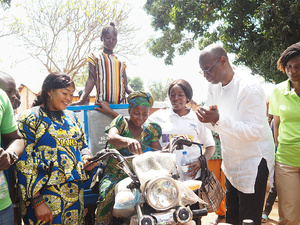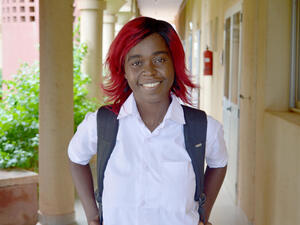Repatriation of refugees from Liberia to Côte d'Ivoire picks up this year
Repatriation of refugees from Liberia to Côte d'Ivoire picks up this year

Smiling Ivorian children return home on a UNHCR convoy to Danane in Côte d'Ivoire.
ABIDJAN, Côte d'Ivoire, May 23 (UNHCR) - Two years after the end of Côte d'Ivoire's brief civil war, growing numbers of refugees have been returning to the country since January after violence last year slowed the rate of returns. But tens of thousands remain in exile.
In the first four months of 2013, some 7,300 Ivorians returned home with UNHCR's help from neighbouring Liberia under a voluntary repatriation programme launched in October 2011. "At this rate, UNHCR anticipates that up to 10,000 refugees will come back before the rainy season starts at the end of June," said Ann Encontre, the UNHCR representative in Côte d'Ivoire.
Over the same period, UNHCR organized the repatriation of about 100 Ivorian refugees from other countries. Most were from Togo (89), but they also included returnees from Algeria, Benin, Cameroon, Ghana, Guinea and Thailand.
The Ivorians had fled their country to escape the violence that followed the presidential election of November 2010 between incumbent Laurent Gbagbo and challenger and winner, Alassane Ouattara. By the time forces loyal to Ouattara had defeated Gbagbo's forces in April 2011, some 250,000 people had fled to Liberia or other countries and hundreds of thousands were internally displaced.
Most have since returned to Côte d'Ivoire with UNHCR help or on their own, but more than 80,000 Ivorians remain in other West African countries, including 61,000 in Liberia.
They are mainly concerned about the security situation, especially following renewed violence last June and July, including the killing of seven UN peacekeepers in western Côte d'Ivoire and the torching of a site for internally displaced people in the town of Duekoue. Repatriation to Côte d'Ivoire ground to a near halt in the second half of last year.
However, the security situation improved towards the end of 2012 and people, like returnee Victor, began to have more confidence in the improved situation. "I'm back in my country and I am happy," Victor told UNHCR after recently returning to his home in western Côte d'Ivoire on a UNHCR convoy. "Liberia treated us very well, but there is no place like home," said the 25-year-old, who lived in the Bahn refugee camp in Liberia's Nimba County for two years.
"The authorities explained to us that the security situation in Côte d'Ivoire has improved, and our friends and family in the country confirmed that," he added. UNHCR organized go-and-see visits for refugees in Liberia who were trying to decide whether or not to return.
"A friend of mine was among them," noted Victor, whose own family had remained in Côte d'Ivoire. "When he called me and told me all was ok, I felt reassured and I decided immediately to come back," added the young man, who said he hoped to find a job and contribute to the development of his country.
The UN refugee agency has been encouraging people to return. "To return to your own country is a real durable solution for a refugee and UNHCR fully supports this decision," said Ali Tchanile Tchacoly, head of a UNHCR sub-office in the Côte d'Ivoire town of Guiglo. "Returnees will be in a position to contribute to the development of their country."
But although things have improved since the middle of last year, insecurity remains a problem in some parts of western Côte d'Ivoire, including the border areas. Reconciliation between the former warring groups is progressing at a slow pace and armed groups occasionally target civilians.
Three armed attacks in popular return areas last March led to the biggest population displacement in months, Encontre noted, while adding that "the situation is slowly returning to normal, and most people have returned to their villages."
The attacks also disrupted return convoys along the road linking Grand Gedeh in eastern Liberia and the Côte d'Ivoire border town Toulepleu, but these have since resumed and on April 29 a group of 425 Ivorians returned home via this route. They included 218 people who returned to the Tai area, where the peacekeepers were killed and to where returns had been suspended for more than a year.
Meanwhile, UNHCR and the Côte d'Ivoire authorities continue to assist refugee returnees on arrival. Every adult returnee receives a cash grant of US$150 and those under 18 years of age each receive US$100. The World Food Programme provides returnees with a food aid pack for a month and UNHCR also distributes a range of non-food items such as blankets, plastic sheeting for shelter, buckets and kitchen utensils.
UNHCR is also involved in programmes aimed at easing the reintegration of the returnees. These include shelter and housing support, easing access to education, rehabilitation of community facilities such as markets and health facilities, and implementation of income-generation projects.
By Lara Palmisano in Abidjan, Côte d'Ivoire






